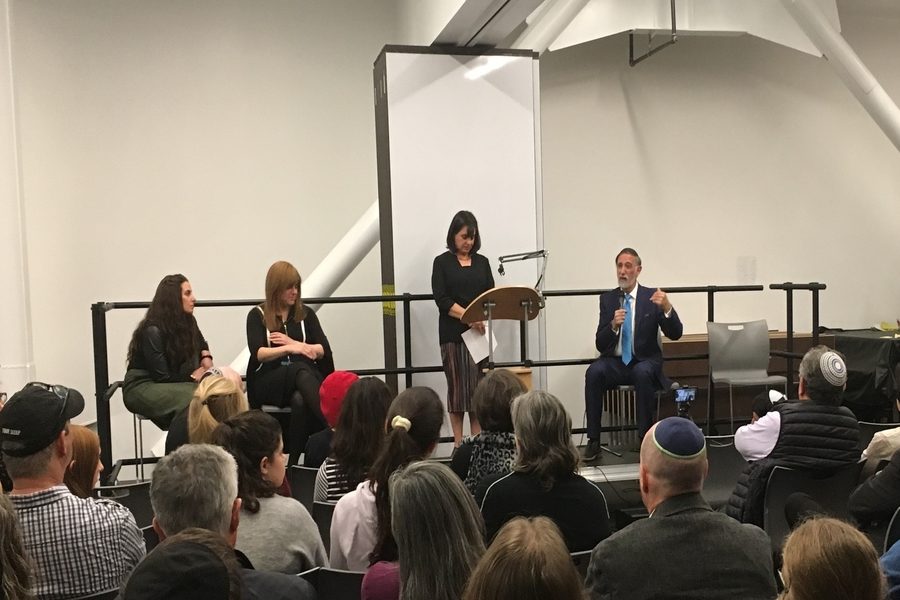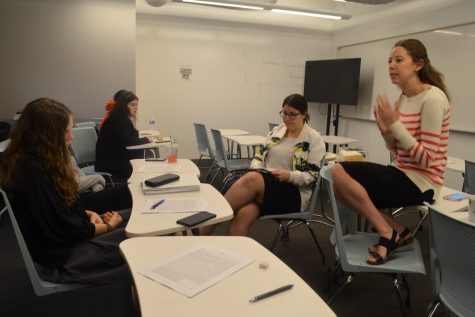Institute event explores power imbalance, modesty ‘in the age of #MeToo’
LISTENING: At a recent Shalhevet Institute event moderated by Ms. Julie Fax, center, members of the community heard Ms. Atara Segal, Rabbi Abraham Lieberman and Rabbanit Pnina Neuworth discuss modesty, leadership and other concerns in Modern Orthodoxy.
At a recent Shalhevet Institute event, the moderator said she had never received a good explanation of tzniut, or modesty.
“It was women’s job to stop men’s impulses — I haven’t heard anything else,” said Ms. Julie Fax, the mother of sophomore Neima Fax a former senior writer at the Jewish Journal, who grew up attending Orthodox schools in Los Angeles.
“What is the goal of tzniut? ” Ms. Fax asked. “What is the impact of focusing on what girls are wearing?”
At an event titled “Tzniut in the age of #MeToo,” Ms. Fax and three panelists — Judaic Studies teachers Ms. Atara Segal and Rabbi Abraham Lieberman and Rabbanit Pnina Neuworth — looked for answers to this and other questions, including how the Orthodox Jewish community can do better to avoid sexism, empower women, limit abuse of power by powerful men, and as the title suggests, enforce modesty in a way that does not blame women’s apparel for men’s misconduct.
“I think the goal is enhancement and spiritual growth,” said Rabbanit Neuworth, who was visiting from Israel where she lectures at the Bar-Ilan University Law School. “Tzniut is a means to achieve that.”
Rabbanit Neuworth compared tzniut to the dress codes in law firms, saying people dress in a certain formal or modest way to indicate they are professional and want to focus on what really matters.
Ms. Segal added a focus on what she called “bilateral tzniut,” which should apply to both women and men. She said that during the time of the Hanukkah story, male modesty was a hotter topic because of the glorification of the male form. So a problem only arises when “Halacha exists in a context that is not appropriate.”
Hundreds of years ago, she explained, tzniut was not an issue because the rest of the world followed modest dress as well. But because in today’s world non-tzniut clothing is popular, keeping tzniut has become a dilemma.
She said what is appropriate now for formal wear for men and women is out of whack, and described a “parody of dress” in which women are cold at events and men are fully covered in suits — even when it’s hot out.
“Now women get cold for evening wear,” Ms. Segal said.
Tzniut, she said, “is about respectful dress in our cultural context, not to sexualize small children or degrade anyone. Six-year-olds shouldn’t have to cover each other up.”
Rabbi Lieberman and Ms. Segal both discussed the struggle of enforcing and explaining modesty as educators in Jewish day schools. To Rabbi Lieberman, tzniut is about privacy.
The “most precious thing we have is our Torah,” Rabbi Lieberman said, so we cover it, but tzniut is not just one thing.
“Tzniut for men is how you talk to women and what words are respectful or not,” he added.
Ms. Segal mentioned Shalhevet’s fashion club, which runs an annual fashion show that presents tzniut styles, and said it is important to highlight positive things like that.
At Shalhevet, dress code has been an recurring issue because students do not agree with the dress code or because they do not like being called out by faculty for violations. Ms. Segal said they have been able to reduce the latter issue by making dress code a policy issue, not a religious one, so students do not feel like they are being reprimanded for a religious reason; rather they are just not in compliance with a school rule.
“It’s any faculty member, not just religious, saying ‘You’re out of dress code,’” she said. “We want to reduce religious antagonism.”
The evening had begun with a discussion of male authority over women in general. The first comment of the evening came from Rabbi Lieberman, who said respect is the most important part of being a man in a position of authority over women. He has been an educator and administration member of multiple all girls high schools for over two decades.
“There’s no way to teach Torah if we’re not on equal footing,” Rabbi Lieberman began. “There has to be mutual respect, I’ve never considered myself a boss…The Torah teaches humility, and certainly if the focus is on the right things, these problems will become minimal surely.”
In her first statement, Rabbanit Neuworth told a story from the midrash about Yalta, a Jewish Babylonian princess who married the head of a yeshiva. A visitor came to the couple for Shabbat, and when Yalta’s husband asked the visitor to pass the kiddush cup of wine to Yalta, the visitor was reluctant, believing it inappropriate for a woman to have wine from the kiddush cup since women are dependent on men.
In a separate story, Rabbanit Neuworth said, Yalta tells her husband she wants to eat milk and meat together, which is prohibited by Jewish law. Her husband offers her the exception to this rule, which is the cooked udders of a cow.
“There are no 100 percent perfect prohibitions in the Torah,” Rabbanit Neuworth said Yalta was trying to show. “But rather the Torah is a balance between to do and not to do. For every rule there is an exception to the rule.”
Although it wasn’t exactly the subject of the evening, Rabbanit Neuworth also spoke at length about the rise in Jewish female leadership and scholarship. Ms. Segal began to speak about this as well, because she is training to be a Yoetzet Halacha, a female advisor for women with issues regarding taharat hamishpacha, laws concerning intimacy and reproductive health.
Studying at Nishmat seminary in Jerusalem during her first year in the program, Ms. Segal said, was “amazing” because it was “different.” Of the 12 women in the program, six just had babies and were nursing, something they would not be able to do if they were shoved into the traditional structure of an all-male yeshiva.
The traditional view of a yeshiva is lots of yelling and men sitting across from each other arguing, according to Ms. Segal. But at Nishmat, the room was not loud, and women sat next to each other to learn with one another.
“It was a different experience, that was not modeled in a men’s yeshiva because we didn’t have the expectation that women should be learning just like men,” she said. “Women learn just like women.
“You have to let women learn as women, not let women fall behind because they’re nursing,” Ms. Segal stated. “Women cannot be expected to speak like men speak at the bima, because then we set them up to fail.”
Unfortunately, Ms. Segal said, a power structure exists in which “female roles bleed from male ones,” meaning that because roles have always been made for men, women are forced to perform in jobs that do not fit them. In order to let women succeed as leaders and scholars, they must be given different expectations and platforms that are fitting for women, she said — like being allowed to bring children to work or to perform differently.
Rabbi Lieberman agreed and added that once women said they wanted to continue to study at a seminary after high school, spaces were made for them to do so.
“Women bring something to the table in any discussion,” Rabbi Lieberman said, “and often when boys and girls are talking, they bring to the table a different perspective. And often times the boys say ‘She’s right.’
“Knowledge is never negative, I have no doubt,” he added.
But there are still some challenges to female leadership in Judaism, especially involving matters of Jewish law. Rabbi Lieberman said he did not know what to do about the Sanhedrin, and ancient Jewish court system in Israel that did not have a female perspective or space. Today, there are Jewish courts called batei din, the majority of which are Orthodox, and are therefore almost always comprised entirely of men.
In their closing statements, Ms. Segal said that any time power is abused, that power also should be in the hands of women.
“So many women’s conversation are in the hands of men,” she said, offering conversion as an example in which male power had been abused with “illegal and felonious behavior.”
A recent example of this is Rabbi Barry Freundel of Washington, D.C., who installed a radio with a hidden camera and watched as women undressed and prepared for the ritual bath used in conversion.
Rabbi Lieberman said people have to be taught that Jews are holy people and do not behave in a way that is sexually inappropriate.
“We need to empower women at the same time of teaching men what is right,” he said.
He said if he could change one thing tomorrow, it would be for everyone to realize that every human being serves a purpose and we need to celebrate their uniqueness.
Rabbanit Neuworth said that when it comes to seeking leadership roles, women are always “guilty until proven innocent” — meaning if a woman has a passion to be more involved, people always ask why or if her motive is right or if she has an agenda. Rabbanit Neuworth hopes to change that.
Ms. Segal hoped everyone could start making their decisions with a sense of community, keeping in mind what is best for everyone.
Ms. Fax ended by urging men to sit “on the other side of the mechitzah.”
“If you notice the boys are the only ones singing when both should be singing, let the girls choose the songs maybe,” said Ms. Fax. “And girls, if you see something from your side, say something.”

Hannah Jannol was Editor-in-Chief of the Boiling Point during the 2017-2018 school year. Since then, she has attended The New School and written for their HerCampus chapter; edited obituaries for The Trace; written poetry for Eleven and a Half literary magazine, and run Instagram and Twitter for Uptown Stories. Her favorite parts of being on Boiling Point were production night and writing long-form features stories, many of which won awards from CSPA, Quill & Scroll and the American Jewish Press Association.











